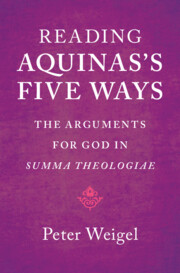Refine search
Actions for selected content:
3 results
Introduction
-
- Book:
- Reading Aquinas's Five Ways
- Published online:
- 05 June 2025
- Print publication:
- 19 June 2025, pp 1-4
-
- Chapter
- Export citation

Reading Aquinas's Five Ways
- The Arguments for God in Summa Theologiae
-
- Published online:
- 05 June 2025
- Print publication:
- 19 June 2025
8 - Reason and Metaphysics in the Transcendental Ideal and the Appendix
- from Part II - The Other Side of the Transcendental Dialectic
-
- Book:
- Kant on the Sources of Metaphysics
- Published online:
- 09 November 2018
- Print publication:
- 29 November 2018, pp 218-242
-
- Chapter
- Export citation
